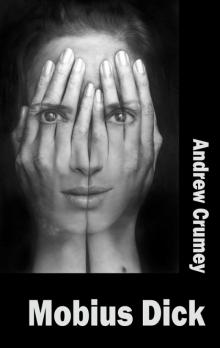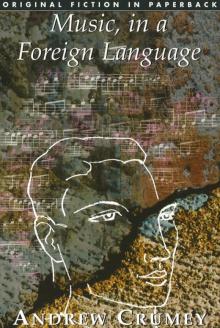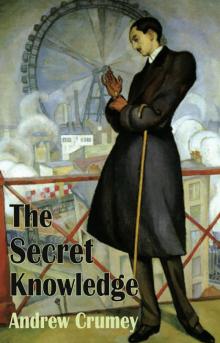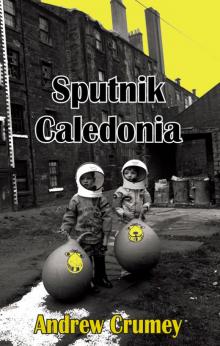- Home
- Andrew Crumey
Sputnik Caledonia Page 3
Sputnik Caledonia Read online
Page 3
Mr Coyle didn’t go to parties. He wouldn’t leave his children all alone to go jigging around somewhere like an idiot.
‘But Moira says she’ll come and keep an eye on Janet and Robbie,’ Mrs Coyle implored. ‘When was the last time we went anywhere, Joe?’
‘That’s not the point,’ said her husband, watching the cloud of exhaust left by Sam’s disappearing car. ‘And he needs to fix his silencer.’
The Brylcreemed announcer’s was the next voice Robbie heard. ‘Which King of England signed the Magna Carta?’
‘John!’ Robbie shouted.
‘Show off,’ Janet snorted, as the answer was confirmed. The useless fact was one Robbie had learned from another quiz programme, though whatever was going on in Scotland in King John’s time was a complete mystery to him, since no one had ever asked about it on telly.
‘So do I just tell them we’re not going?’ said Mrs Coyle. ‘And all because you won’t let me get you a decent pair of shoes?’
‘There’s no need to be irrational about it, pet. You may be a woman but we should still be able to discuss things logically.’
The overheard conversation continued while Robbie and Janet gazed at the mounting triumph of St George’s School over Langham Priory.
‘Why do you not want to go, then?’ Mrs Coyle asked her husband. ‘We haven’t been to a dinner dance in years.’
‘I don’t like leaving the children. What if Moira puts her cigarette in the ashtray on the arm of the chair …’
‘She hardly smokes!’
‘… then goes into the kitchen and forgets about it?’
The struggle of Langham Priory was overtaken in Robbie’s imagination by the terrible scene his father proposed. Distracted by thirst and welcoming the opportunity presented by the adverts in the middle of some boring play, Moira decides to go and make herself a cup of tea. She takes a last ladylike drag on her slim cigarette, held between narrow long-nailed fingers, then deposits the fag on the edge of the heavy glass ashtray. She stands, and in the sort of close-up featured regularly in fire-brigade films, the cigarette is seen still smouldering where it lies, its lipstick-smeared end dangling terrifyingly over the arm of the highly inflammable armchair.
Upstairs, we see two children lying together in bed, Robbie and Janet, a convenient wedge of pale light making their monochrome faces clearly visible. Janet clutches her favourite doll; Robbie has dozed beneath Tom Sawyer, unopened and unread but recently checked out of the library by his mother, her faith in Dr Muir’s prescription still not dashed. The next scene shows the dinner dance, Mr and Mrs Coyle sitting at a table with unknown friends. Mrs Coyle raises a sherry glass to her smiling, painted lips; Mr Coyle silently eyes his pint on the table, his face showing sudden doubt.
The cigarette is toppling. The burning of its tip has caused an imbalance, wholly in accord with the law of leverage discovered by Archimedes and explained at great length by Mr Coyle one Sunday afternoon. The cigarette, the ashtray and the chair arm fill most of the screen, but beyond them, in the background, we see an illuminated kitchen doorway where Moira pauses, lost in fluffy-headed feminine thought. It’s exactly as Mr Coyle feared, sitting gazing at his flattening pint. Moira’s wondering about a nice dress she saw in Arnott’s, or her next haircut. She’s forgotten the kettle, never mind the cigarette, and it’s just as well the former is electric or else the stupid woman would be blowing up the entire street. Our next view of the fatal fag has it starkly presented in silhouette, falling, nestling comfortably among the synthetic fibres of the seatcover like a slain bird tumbling onto heather. The swirling smoke thickens and becomes a flame.
In the pub, Mr Coyle turns to his daft wife. ‘I think we should go home.’ And in a rain-slicked street, another hopeless female screams for help, pointing up at the smoky bedroom where two suffocating children lie trapped. ‘Remember,’ the film concludes, ‘fire kills.’
‘So can I tell Moira we’ll be going, then?’ said Mrs Coyle.
‘Aye, all right,’ her husband conceded.
Robbie and Janet watched St George’s romp to victory. ‘And thank you to Langham Priory for being such good sports, just bowled out in the final innings,’ the Brylcreemed announcer cryptically concluded.
Robbie later contemplated, over his tea, the forthcoming destruction by fire of himself and his sister while his mum and dad went off jigging like idiots somewhere.
‘You’re very quiet, Robbie,’ said Mr Coyle.
‘I was wondering if you really could move the world with a lever.’ This was what Archimedes had claimed he could do.
‘You just need the right place to stand, that’s all,’ Mr Coyle explained. ‘And a very big lever.’
On a golf course somewhere, Archimedes was swinging a club. Archimedes became Chic Murray, the golf ball became the earth, and the Coyle family were launched along with everyone else into outer space.
‘Robbie,’ said his mother after tea, ‘can you nip next door with these things for Mrs Dunbar?’ She handed him the dress-making paraphernalia she’d borrowed from her neighbour.
‘Is the Small Doll in?’ Mr Coyle asked his wife from behind the dog-eared cover of Modern Photographer.
‘She’s a doll now is she?’ The nickname would not survive for long. ‘I’ve no reason to think she’s out. Off you go, Robbie.’
A moment later he was standing outside his house clutching the sewing box, feeling like astronaut Ed White when he made the first space walk. Four paces separated him from the Dunbars’ front door, where he managed to free a hand and reach for the doorbell. Within the house a mellow two-note chime was heard, and the figure who opened the door was young Sheena Dunbar, fair-haired, rosy-cheeked, inhabitant of another planet. She looked disappointed but amused. Without saying anything or acknowledging his existence, she looked over her shoulder and with raucous confidence called, ‘Maw!’
Sheena was made of plastic from a faraway galaxy. Robbie wondered if she had a button you could press that made her hair grow. Her mother appeared.
‘There you are, Mrs Murray,’ Robbie announced, immediately realizing his mistake. ‘I mean, Mrs Dunbar.’ He tried to be casual about it, but errors of speech aren’t the sort of thing you can rub out so nobody will ever notice them. The two dolls, mother and daughter, were gazing at him as he held out the stuff Mrs Coyle had borrowed. Sheena was smirking.
‘Thanks ever so much, young man,’ said Mrs Dunbar, stooping to pat Robbie on the head while on a golf course her husband stood frozen in post-swing, shielding his eyes and watching the earth retreat into space. ‘My, what a big lad you’re getting. Here, come on in and I’ll gie ye a wee treat.’
Robbie followed them into the doll’s house. He’d been here once or twice before, but never without his parents, and it was like the question on telly once about how to change a left-handed glove into a right-handed one. Answer: turn it inside out. Built to the same pattern as the rest of the scheme, the Dunbars’ was nevertheless a mirror image of the Coyles’, so that instead of going left into the kitchen you went right, which was where Robbie was led while Sheena returned to join her sister in the living room, the two of them erupting into big girls’ laughter.
The kitchen was like the flight deck of a spaceship, very white with lots of cupboards, and with the smell of a hostile life form issuing from something simmering on the stove. ‘Here y’are, son,’ said Mrs Dunbar, selecting from a jar brought down off a shelf a bright red sweetie wrapped in cellophane. ‘Still doing well at school, are you? Aye, you’re growing. Won’t be long before you’re taking lassies out to the dancing, I’m sure.’ The thought made Robbie feel instantly sick – or perhaps it was just the alien smell of the Dunbars’ evening meal. ‘You run along now and tell your mother if she wants the sewing machine she can have it any time.’
Then Robbie found himself in space again, with the airtight hatch of Number 24 closing behind him. He drifted back to the safety of his own craft, quite forgetting about the sewing machine but thinki
ng instead of Sheena and Louise laughing in the living room. Would there still be smiles on their faces when the Revolutionary Committee sentenced the whole family to death? At the last minute, Robbie would intercede to save them, and they’d realize he wasn’t such a wee squirt after all.
‘There he’s there,’ Mr Coyle announced to his wife later when Sam Dunbar returned in his timber-trimmed Morris Traveller, a puttering Tudor cottage on wheels. Robbie briefly stood up to look out of the window. ‘No need to stare,’ Mr Coyle told him, but Robbie had time to see Archimedes in his bunnet, coming home after moving the world with a golf club.
5
The combined efforts of Stevenson and Twain having done nothing to stop Robbie from wetting the bed, when he next visited the library with his mother she allowed him to exchange Tom Sawyer and The Boy’s Book of Facts for Russian In One Month and Rocket to the Stars. The woman at the desk eyed him with some incredulity as he checked them out. ‘He’s going to be an astronaut,’ Mrs Coyle explained.
In Russian some letters are written back to front and others are completely made up. Robbie mastered the equivalent of ‘good morning’, but felt the phrase would be of limited value during a solo mission into the endless night of space. The only place in the phrase book where the Moon was mentioned was in a section called Making Friends, whose chattiness sent shivers of revulsion down his spine. Do you like opera? Are you married? Surely astronauts didn’t have to say stuff like that. But the numbers from zero to twenty were useful, and Robbie recited them in reverse order while training in his flight simulator. Really it was a cupboard under the sink that smelled of Pledge and dead beetles, and he could only just fit inside if he took the boxes out first; but by overcoming his fear of getting stuck in it he felt sure he could attain an astronaut’s obligatory coolness of head, and when he pulled the door closed the darkness was no simulation; it was the true blackness of space, the loneliness of the grave, as he counted down to blast-off from a windswept cosmodrome in Central Asia.
In space there’s no air and no gravity. You wear a helmet like a goldfish bowl (or in Robbie’s case a balaclava and his dad’s welding goggles), and things float around if you let go of them.
‘Why’s there no gravity in space?’ he asked his father, who was mending a watch.
‘Because gravity can’t go on forever, it runs out after a while, and space is a long way off.’
But Robbie knew that tides are caused by the gravity of the Moon. ‘Dad,’ he said, ‘if the Moon’s gravity can get to Earth then why can’t the Earth’s gravity get into space?’ His father, peering by the light of a table lamp at a gleaming, lifeless mainspring, said it was all a wee bit complicated. And for the first time, Robbie glimpsed the shoreline of paternal fallibility.
Apart from his cupboard simulator, Robbie’s other main piece of training equipment was the radiogram in the living room. A great four-legged box of veneered chipboard whose teak finish matched the G-plan dining table, the radiogram was receiver and gramophone combined, a melding of parts and ideas into a single word that was new and modern, like ‘electromagnetism’ or ‘Politburo’, the former being the means by which all the world’s radio stations could be brought into a Scottish living room, the latter the source of a viewpoint more balanced, in Mr Coyle’s considered view, than the sly propaganda of Radio Free Europe or the BBC World Service.
Electricity is like water, Robbie learned. Current is the amount that’s flowing, capacitance is the volume of a flask, and voltage the height of a waterfall. We all of us exist at the bottom of a deep sea filled with invisible particles and fields, rebounding signals made murky during daytime by the heat of the sun, but becoming clearer in the cool of the night, just before bed, when, at the turn of a knob, the endless hidden flux could be summoned into life, of waltzes and jazz combos, whistles and pops, emanating from gold-lettered cities strung out across the dial – Frankfurt, Paris, Madrid – filling the room with monotonous foreign chatter or the distant echoing of an ancient dance band whose music would rise then slowly fade into crackling surf, like an ocean liner battling against a long rolling swell. Such nocturnal voyages were a treat both children enjoyed if there was nothing on television, and in this way Budapest had become more familiar to Robbie than the bus ride into Glasgow; Warsaw for him was a polar island built out of four notes played on a vibraphone each hour and the voice of a woman for whom the world news was a random floe of harsh syllables, out of whose icy depths an intelligible name would occasionally crest like the sudden fin of a whale. By day, when the cosmic signals were kept dormant by the sun’s harsh glare, the radiogram still served its purpose in Robbie’s conquest of space, for then it was his mission-control centre, its every city a planet, and simply by pressing one of the waveband buttons he could transport himself across the galaxy at the speed of light.
His best friend Scott failed to see the excitement of fiddling with the silent radio dial when the two of them played together in Robbie’s house after school one day. Robbie described the alien planets they both could fly to in an instant, but Scott was more keen on going outside to play football.
‘That’s a very good idea,’ said Mrs Coyle. ‘And you could do with the exercise, Robbie.’
‘Can’t we go to the burn instead?’ Robbie pleaded, his opinion of ball games being much like his father’s.
‘We could look for tadpoles,’ Scott suggested.
‘All right, but be careful,’ said Mrs Coyle, fetching two empty jam jars for them from the kitchen. ‘And don’t be too long.’
She saw them out the door, and as the two boys headed along the street towards the waste ground a few hundred yards away where the little burn flowed past slag heaps from a former colliery, Scott said, ‘You’re maw’s dead nice. I’m always getting a leathering off mine for something. Then when my da gets in he leathers me for getting leathert.’ Robbie didn’t know what to say; he was just glad not to be Scott, who began describing how his mother would beat his knuckles with a wooden spoon whenever she got annoyed with him.
The burn was little more than an ankle-deep trickle offering purpose to a crack in the ground, but frogs and newts could be found among its fronds of weed, and soon Scott was on his bare knees, clawing spawn by the handful and dropping gobs of curranty snot into his jam jar, while Robbie, kneeling beside him, took a more cautious approach, scooping his chunky glass container through the turbid water, releasing fat bubbles from his submerged jar but catching nothing.
‘Don’t you ever wonder why they’re so nice?’ asked Scott.
‘Who? My parents?’
‘Aye,’ said Scott. ‘Maybe they’re hiding something.’
‘What do you mean?’
Scott had seen it in a film; a mum and dad who were absolutely perfect, always good to their weans and everyone else. All because they had a secret.
‘What sort of secret?’ Robbie asked him, rising to his feet with a full jar of murky water in his hand.
The perfect parents in the film were spies who told the Russians how to make bombs, and they got caught and put in jail. ‘Maybe your parents are spies,’ Scott suggested.
‘They are not!’
‘Or maybe they stole a load of money and they’re on the run frae the polis.’ The sheer glamour of this scenario was enough to make Robbie dismiss it instantly, but Scott then offered another. ‘Maybe the people you call your mum and dad kidnapped the real ones when you were a baby. Maybe they’re aliens in disguise. How would you know?’
This was an altogether more powerful hypothesis. The thought that aliens might abduct and impersonate one’s parents was eminently reasonable to Robbie, since that was just the sort of thing aliens did. By nature cruel, intelligent and devious, they delighted in subjugating their inferiors in whatever way they could. Somewhere, on a distant planet, the real Mr and Mrs Coyle might now be heaving sacks of glistening toxic dust, in a mine populated by slaves taken from every corner of the universe. Mrs Coyle would be saying, ‘I wish we could toxic-dust b
ack where we came from,’ and Mr Coyle would be telling her, ‘It’s your fault we got here in the first place, woman.’
‘Maybe your pretend parents wear rubber costumes,’ Scott continued, ‘and when you go to bed at night they take them off, and they’ve got horrible ugly faces with big long fangs, and they get their orders off the telly.’
It all sounded so plausible.
‘And maybe they’re just waiting to finish mending their spaceship, then they’ll go away and take you as well.’ From where he knelt, Scott stared up at Robbie, seeing the fear and doubt he’d caused. Then with a loud laugh and a flick of his arm he hurled the frogspawn into the air, launching it on an arc that Robbie barely managed to avoid. ‘Can you no tell I’m only kidding? You should see the look on your face!’
Robbie silently emptied his jar into the burn. ‘I’m going home.’
Scott scowled. ‘Don’t be such an eejit.’
‘You’re the eejit.’
‘Aye, well, mind they aliens in your hoose.’
Angry and upset, Robbie turned and walked pensively home, leaving Scott to continue the spawn hunt alone. ‘Enjoy yourself?’ his mum asked when she opened the door, and Robbie nodded silently. He’d got the whole thing worked out by now.

 Mobius Dick
Mobius Dick Music, in a Foreign Language
Music, in a Foreign Language The Secret Knowledge
The Secret Knowledge Sputnik Caledonia
Sputnik Caledonia